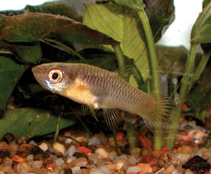Growing up in dangerous waters
Wild guppies that live in dangerous places don't live fast and die young as scientists previously thought.
Share this:
- Share via email (Opens in new window) Email
- Click to share on Facebook (Opens in new window) Facebook
- Click to share on X (Opens in new window) X
- Click to share on Pinterest (Opens in new window) Pinterest
- Click to share on Reddit (Opens in new window) Reddit
- Share to Google Classroom (Opens in new window) Google Classroom
- Click to print (Opens in new window) Print
By Emily Sohn
Kids in this country, many parents think, grow up too fast because they face a disturbing environment. There are guns on TV, violence in the news, and bad language on the streets.
Many animals live in far more hazardous habitats, often where they’re likely to become another animal’s lunch. Scientists used to think that animals in such environments age more quickly and die sooner, even if predators don’t eat them. According to one explanation, animals in danger tend to reproduce at younger ages. That could mean that their bodies are going all out when they’re young and not putting much energy into staying healthy for the long term.
 |
|
Pictured shortly before her death, this guppy reached the ripe old age of 4 years and 64 days.
|
| D. Ghalambor |
A new study of guppies, though, came to a different conclusion. Scientists from the University of California, Riverside, and elsewhere have been studying wild guppies in Trinidad for 20 years.
In some places on the Caribbean island, the guppies face many predatory fish. In other places, they live safer lives. Previous work has shown that guppies that live in treacherous waters start reproducing at younger ages.
To see how the safety conditions affect the later lives of the fish, the researchers raised two sets of guppies in the lab. One set came from predator-rich waters. The other set came from predator-free areas. Then, the scientists permitted these groups to breed separately with no predators around. The researchers looked at the grandchildren of the wild guppies to see the effects of traits controlled by genes.
The grandchildren of the guppies that had come from high-predator places didn’t show a tendency to die young. The researchers found only one difference. It turned up in a test in which the scientists plonked a golf ball against the side of each aquarium. The speed with which a guppy sped off dropped more dramatically with age among those guppies whose ancestors had lived in dangerous waters.
These mixed results leave the researchers with lots to think about. The speed of growing up might be a more complicated concept than it seems. In any case, you’re only young once. Enjoy it.






